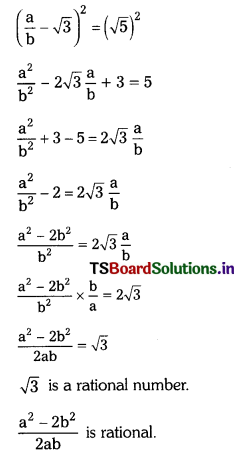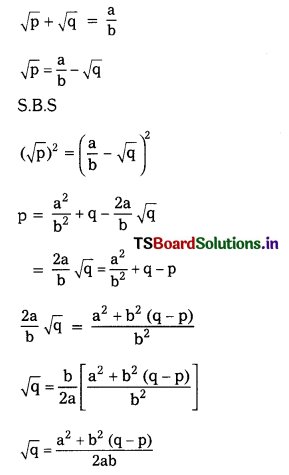Students can practice TS 10th Class Maths Solutions Chapter 1 Real Numbers Ex 1.4 to get the best methods of solving problems.
TS 10th Class Maths Solutions Chapter 1 Real Numbers Exercise 1.4
Question 1.
Prove that the following are irrational.
(i) \(\frac{1}{\sqrt{2}}\)
Solution:
\(\frac{1}{\sqrt{2}}\)
Let us assume to the contrary that \(\frac{1}{\sqrt{2}}\) is rational. Then there exist co-prime positive integers ‘a’ and ‘b’ such that 1 a
\(\frac{1}{\sqrt{2}}\) = \(\frac{\mathrm{a}}{\mathrm{b}}\)
\(\sqrt{2}\)a = b
\(\sqrt{2}\) = \(\frac{b}{a}\)
Here ‘a’ and ‘b’ are integers, \(\frac{b}{a}\) is rational.
∴ \(\sqrt{2}\) is rational.
This contradicts the fact that \(\sqrt{2}\) is irrational.
So our assumption is wrong.
Hence \(\frac{1}{\sqrt{2}}\) is irrational.
(ii) \(\sqrt{3}\) + \(\sqrt{5}\)
Solution:
\(\sqrt{3}\) + \(\sqrt{5}\)
Let us assume to the contrary that \(\sqrt{3}\) + \(\sqrt{5}\) is a rational number.
Then there exist co-prime positive integers ‘a’ and ‘b’ such that
\(\sqrt{3}\) + \(\sqrt{5}\) = \(\frac{a}{b}\)
\(\frac{a}{b}\) – \(\sqrt{3}\) = \(\sqrt{5}\)
S.B.S.

This contradicts the fact that \(\sqrt{3}\) is irrational.
∴ Hence, \(\sqrt{3}\) + \(\sqrt{5}\) is irrational.
![]()
(iii) 6 + \(\sqrt{2}\)
Solution:
6 + \(\sqrt{2}\)
Let us assume on the contrary that 6 + \(\sqrt{2}\) is rational. Then there exist co-prime positive integers ‘a’ and ‘b’ such that
6 + \(\sqrt{2}\) = \(\frac{a}{b}\)
⇒ \(\sqrt{2}\) = \(\frac{a-6 b}{b}\)
\(\sqrt{2}\) is rational.
\(\frac{a-6 b}{b}\) is rational.
This contradicts the fact that \(\sqrt{2}\) is irrational, so our assumption is wrong.
∴ 6 + \(\sqrt{2}\) is irrational.
(iv) \(\sqrt{5}\)
Solution:
\(\sqrt{5}\)
Let us assume, to the contrary that \(\sqrt{5}\) is irrational then there exist co-prime positive integers a and b such that
\(\sqrt{5}\) = \(\frac{a}{b}\)
\(\sqrt{5}\) b = a
S.B.S. we get
(\(\sqrt{5}\) b)2 = (a)2
5b2 = a2 ……. (1)
5 divides a2.
Hence 5 divides a.
We can write a = 5c for some integer c.
Substitute a = 5c in (1) we get
5b2 = (5c)2
5b2 = 25c2
b2 = \(\frac{25 c^2}{5}\)
b2 = 5c2
5 divides b2 and 5 divide b.
‘a’ and ‘b’ have atleast as a common factor.
This contradicts the fact that ‘a’ and ‘b’ have no common factor other than 1.
So our assumption is wrong.
∵ \(\sqrt{5}\) is irrational.
(v) 3 + 2\(\sqrt{5}\)
Solution:
3 + 2\(\sqrt{5}\)
Let us assume, to the contrary that 3 + 2\(\sqrt{5}\) is rational. Then there exist co-prime positive integers ‘a’ and ’b’ such that
3 + 2\(\sqrt{5}\) = \(\frac{a}{b}\)
2\(\sqrt{5}\) = \(\frac{a}{b}\) – 3
\(\sqrt{5}\) = \(\frac{a-3 b}{2 b}\)
\(\sqrt{5}\) is rational.
\(\frac{a-3 b}{2 b}\) is rational.
This contradicts the fact that \(\sqrt{5}\) is irrational, so our assumption is wrong.
3 + 2\(\sqrt{5}\) is irrational.
![]()
Question 2.
Prove that \(\sqrt{p}\) + \(\sqrt{q}\) is an irrational, where p, q are primes.
Solution:
Let us assume to the contrary that \(\sqrt{p}\) + \(\sqrt{q}\) is rational. Then there exist co-prime positive in-tegers ‘a’ and ‘b’.

We know that square root of any prime number is irrational, we get \(\sqrt{q}\) is rational.
This contradicts the fact that \(\sqrt{q}\) is irrational.
So our assumption is wrong.
∵ \(\sqrt{q}\) is irrational.
∵ \(\sqrt{p}\) + \(\sqrt{q}\) is irrational.